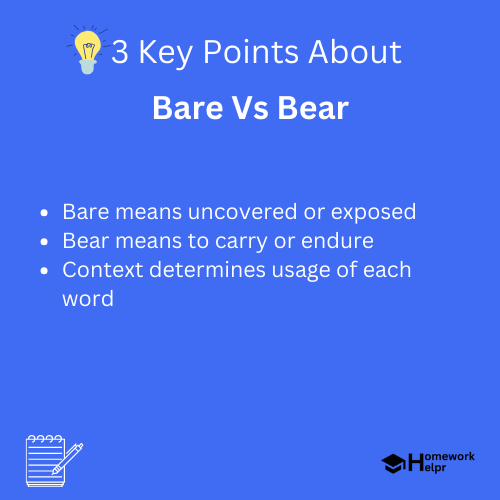📝 Summary
Understanding the difference between bare and bear is essential for effective communication. Bare is an adjective that describes something exposed or lacking a covering, while bear can function as both a verb and a noun, meaning to carry, endure, or referring to a large mammal. The context significantly influences their meanings, and common mistakes arise from their similar pronunciations. By using memory aids and context, one can easily master the distinction between bare and bear.
Understanding the Difference: Bare Vs Bear
Language is a beautiful blend of words, each carrying its unique meanings and nuances. Among the various pairs of words that often confuse people are bare and bear. Although they sound similar in pronunciation, their meanings and uses are entirely different. In this article, we will explore the differences, usage, and grammatical implications of these two words.
What Does “Bare” Mean?
The word bare is an adjective. It refers to something that is exposed, uncovered, or lacks any covering. When we describe something as bare, we often evoke a sense of emptiness or the absence of something that is usually present. For example, a bare tree in winter signifies that it has no leaves.
- A room with no furniture might be described as bare.
- The ground after a harvest could be referred to as bare soil.
- When someone is wearing minimal clothing, they can be said to be in a bare state.
Definition
Bare: Uncovered, exposed, or without a covering.
Examples
Imagine walking through a forest in winter. The trees are bare, revealing their twisted branches against the cold, clear sky.
What Does “Bear” Mean?
On the other hand, bear serves multiple functions in the English language. It can be a verb or a noun, and its definitions vary accordingly. As a verb, to bear means to carry or support the weight of something, to endure or tolerate, or to give birth. For example, a mother bear will bear her young during the spring season.
- The burden on her shoulders was heavy, but she managed to bear it.
- He couldn’t bear the disappointment of losing the game.
- A woman may bear a child after nine months of pregnancy.
Definition
Bear: To carry, support, or endure; also a large mammal known for its strength.
Examples
In a sentence: “She had to bear the pain of losing her best friend.”
Contextual Usage of Bare and Bear
The context in which these words are used plays a vital role in understanding their meanings. A simple misplacement of these functions can lead to confusion. Let’s consider some sentences that illustrate this:
- After the storm, the landscape was bare, exposing all the roots.
- He could not bear to watch the sad movie again.
- The bear wandered through the forest in search of food.
In the examples above, you can easily see how the meanings of bare and bear are distinct and contextual. Misuse can lead to awkward phrasing, making the intended meaning unclear.
❓Did You Know?
The word bare comes from the Old English word “b√¶ra,” which means to uncover or expose, while bear can trace its origins to the Old English word “bera,” meaning the animal we know today.
Common Misconceptions and Tips to Remember
It‚’ common for students to mix bare and bear because they sound alike. Here are some tips to help you remember the differences:
- Remember that bare has an “a” for absence‚Äîit’s devoid of any covering.
- Link bear to ‚Äúweight” as both bear the weight and bear children imply some sort of burden or responsibility.
- You can also think of the letter “e” in bear as standing for endure, connecting it with its meaning.
By creating such associations, students can more easily remember which word to use in a given context.
Examples in Literature and Everyday Conversation
Literary works often play with words and can serve as excellent examples of how to use bare and bear properly. For instance, in Shakespeare’s plays, characters often bear their emotions bare as they face trials and tribulations. Let‚’ examine some examples:
- In a poetic line: “The bare earth seemed to sigh under the weight of unbending shoulders, who could bear no more sorrow.”
- Conversationally: “Do you think we can bear the cold winter with a bare cabinet?”
Such examples highlight the beauty of language while demonstrating correct usage.
Conclusion
Understanding the distinction between bare and bear is crucial for effective communication. While one indicates absence or exposure, the other encapsulates the ideas of carrying, enduring, or the animal itself. Through mindful usage, examples, and memory aids, anyone can conquer this linguistic hurdle.
By embracing the intricacies of language, we enrich our communication and express ourselves with clarity. So the next time you find yourself hesitating between these two words, remember their meanings and contexts to convey your thoughts accurately!

Related Questions on Bare Vs Bear
What is the meaning of bare?
Answer: Bare means uncovered, exposed, or without covering.
What is the meaning of bear?
Answer: Bear means to carry, support, or endure.
How can I remember the difference?
Answer: Remember bare for absence and bear for weight.
Can both words be used in a sentence?
Answer: Yes, context is key for their correct usage.
